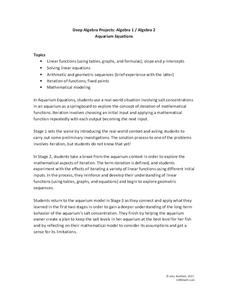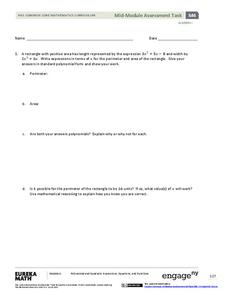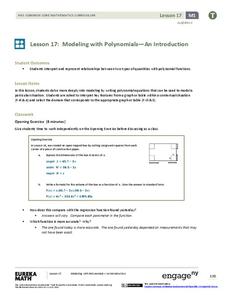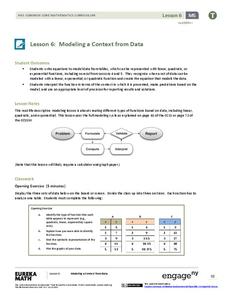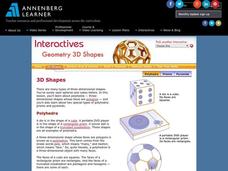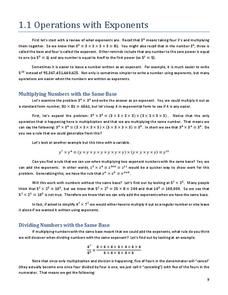Concord Consortium
All-in-All Problems
Graphs, functions, symbols, and more! Use these strategies to model everything from the flow of a river to the number of cars passing a toll booth. Presented differently but solved similarly, learners consider five different scenarios...
Curated OER
Converting Fractions to Decimals
Help mathematicians convert fractions to decimals and vice versa through these exercise sets. First, they write out nine fractions as decimals. This is really a practice in place value, as all the denominators here are 10. One of them...
02 x 02 Worksheets
Inverse Variation
Discover an inverse variation pattern. A simple lesson plan design allows learners to explore a nonlinear pattern. Scholars analyze a distance, speed, and time relationship through tables and graphs. Eventually, they write an equation to...
5280 Math
Aquarium Equations
Take a look at linear functions in a new environment. A three-stage algebra project first asks learners to model the salt concentration of an aquarium using linear functions. Then, using iterations, pupils create a set of input-output...
EngageNY
Mid-Module Assessment Task - Algebra 1 (module 4)
Performance task questions are the most difficult to write. Use this assessment so you don't have to! These questions assess factoring quadratics, modeling with quadratics, and key features of quadratic graphs. All questions require...
Curated OER
Subtracting
Help kids visualize subtraction by assigning these sets of objects for them to subtract. They examine an example before completing the seven equations on their own. For each, learners cross out the subtrahend value and count the...
EngageNY
Modeling with Polynomials—An Introduction (part 2)
Linear, quadratic, and now cubic functions can model real-life patterns. High schoolers create cubic regression equations to model different scenarios. They then use the regression equations to make predictions.
EngageNY
Modeling a Context from Data (part 1)
While creating models from data, pupils make decisions about precision. Exercises are provided that require linear, quadratic, or exponential models based upon the desired precision.
EngageNY
Ferris Wheels—Using Trigonometric Functions to Model Cyclical Behavior
Have class members going in circles as they model the path of a Ferris Wheel using trigonometric functions. Building on the previous lesson in this series on transformations, learners use trigonometric functions to model wheels of...
Annenberg Foundation
Geometry 3D Shapes: 3D Shapes
Explore vocabulary related to three-dimensional shapes. An instructional website describes the characteristics of different geometric solids. Learners can use an interactive component to view nets, faces, vertices, and edges of common...
EngageNY
Slicing a Right Rectangular Pyramid with a Plane
How many ways can you slice a pyramid? The 18th lesson of the 29-part series examines the multiple planes of a rectangular pyramid. Pupils study each slice to determine its shape and relation to the different faces.
Mathematics Vision Project
Module 7: Modeling with Functions
The sky's the limit of what you create when combining functions! The module begins with a review of transformations of parent functions and then moves to combining different function types using addition, subtraction, and...
Charleston School District
Operations with Exponents
It just multiplies out. The lesson provides the rules for operations with exponents and keeps them as positive integers in the lesson. Videos explain the rules for the operations with exponents while working out examples.
Charleston School District
Negative Exponents
What happens if the exponent is negative? The resource takes a look at a problem two different ways, with one resulting in a negative exponent. The approach provides an explanation of how to evaluate negative exponents.
Charleston School District
Scientific Notation and Appropriate Units
How do you write a number in scientific notation? The handout and video provide an explanation on how to convert from standard form into scientific notation and vice versa. The resource also contains a short discussion about choosing...
Balanced Assessment
Number Game
It's all in the numbers! Create a mathematical model to analyze a number game and develop a winning strategy. Using a given numerical pattern, scholars write an expression to model the scenario. They then interpret the pattern of the...
Beyond Benign
Ecological Footprint
How does your lifestyle measure up in terms of your ecological footprint? Young ecologists examine their impact on the planet using an insightful online calculator. A short quiz asks users to rank the size of their homes, their energy...
Mathematics Vision Project
Module 5: Modeling with Geometry
Solids come in many shapes and sizes. Using geometry, scholars create two-dimensional cross-sections of various three-dimensional objects. They develop the lesson further by finding the volume of solids. The module then shifts...
US Department of Commerce
Let's Count!
Counting objects is easy as one, two, three. Young mathematicians count objects in the classroom and create data tables to record their results. They then write comparison statements and answer questions about the data.
US Department of Commerce
Immigration Nation
People come and people go. Given tabular census data on the annual number of immigrants from four different regions of the world between 2000 and 2010, pupils create double bar graphs and line graphs from the data. They analyze their...
US Department of Commerce
The Place of My State
State the population of the state. Pupils research census data on the total population, the number of children their age, and the number of children of the same age and gender in their states. They write these numbers in standard,...
Curated OER
Binomial Expansions
In this algebra worksheet, students factor and expand equations using binomial expansion. They identify coefficients of different terms. There are forty-four questions with an answer key.
Curated OER
Binomial Expansion
In this algebra worksheet, students expand binomials and identify different terms. They expand the function using the binomial theorem. There are forty-four questions with an answer key.
BW Walch
Linear & Exponential Functions
Positioned inside the framework of linear and exponential functions, this lesson is more of an investigation into the effects of changing variables and constants inside an expression. The author takes familiar formulas, those for...
Other popular searches
- Esl Math Terms
- Math Terms and Glossary
- Image in Math Terms
- Teaching Math Terms
- Math Terms Test
- Math Terms Borrow
- Math Terms Choosing
- Math Terms Borrow Mean
- Ell Math Terms
- Math Terms Circle
- Math Terms Puzzle
- Math Terms "Circle"



